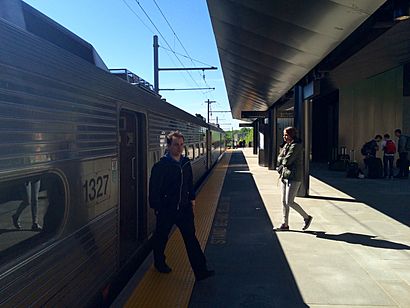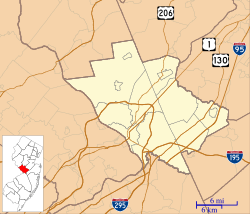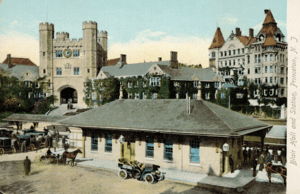Princeton station (NJ Transit) facts for kids
Quick facts for kids
Princeton
|
|||||||||||||
|---|---|---|---|---|---|---|---|---|---|---|---|---|---|

The 2014 Princeton station with a train at the station.
|
|||||||||||||
| Location | Alexander Street, 1 block south of University Place Princeton, NJ 08540 |
||||||||||||
| Coordinates | 40°20′32″N 74°39′32″W / 40.3421°N 74.6589°W | ||||||||||||
| Owned by | Princeton University | ||||||||||||
| Operated by | NJ Transit | ||||||||||||
| Line(s) | Princeton Branch | ||||||||||||
| Platforms | 1 side platform | ||||||||||||
| Tracks | 1 | ||||||||||||
| Connections | |||||||||||||
| Construction | |||||||||||||
| Parking | Yes | ||||||||||||
| Bicycle facilities | Yes | ||||||||||||
| Disabled access | Yes | ||||||||||||
| Other information | |||||||||||||
| Fare zone | 19 | ||||||||||||
| History | |||||||||||||
| Opened | 1865 | ||||||||||||
| Rebuilt | 1918, 2014 | ||||||||||||
| Traffic | |||||||||||||
| Passengers (FY 2017) | 814 (average weekday boardings) | ||||||||||||
| Services | |||||||||||||
|
|||||||||||||
|
|||||||||||||
|
Princeton Railroad Station (1918)
|
|||||||||||||
|
U.S. Historic district
Contributing property |
|||||||||||||
| Location | Princeton, New Jersey, USA | ||||||||||||
| Built | 1918 | ||||||||||||
| Architect | Alexander C. Shand | ||||||||||||
| Architectural style | Collegiate Gothic | ||||||||||||
| Part of | Princeton Historic District (ID75001143) | ||||||||||||
| MPS | Operating Passenger Railroad Stations TR | ||||||||||||
| Significant dates | |||||||||||||
| Designated CP | June 27, 1975 | ||||||||||||
Princeton station is the last stop on the Princeton Branch train line. This line is part of the NJ Transit train system. The station is located right on the Princeton University campus in Princeton, New Jersey.
At the other end of the line, at Princeton Junction, you can connect to other trains. These include NJ Transit's Northeast Corridor Line and some Amtrak trains during busy times. The short shuttle train that runs between Princeton and Princeton Junction is called the "Dinky." People also used to call it the "PJ&B," which stood for "Princeton Junction and Back."
The Dinky line is only about 2.7 miles (4.3 km) long. It runs on a single track. This makes it the shortest regular commuter train line in the United States. There have been ideas to add a special bus lane along the Dinky's path. This would be part of a new fast bus system.
The Dinky train service was stopped for a while from October 2018 to May 2019. During this time, shuttle buses took its place. This happened because NJ Transit was installing and testing a new safety system called positive train control on all its lines.
In 2006, Princeton University suggested moving the station about 460 feet (140 meters) south. NJ Transit and the local planning board approved this idea. However, some people, like commuters and university graduates, were not happy about the plan. The old, historic 1918 train station closed for good on August 23, 2013. A temporary station opened nearby on August 26, 2013. It operated until November 9, 2014. During this time, buses helped people get between the old station, the temporary one, and Princeton Junction. The new permanent Princeton station opened on November 17, 2014. It was designed by an architect named Rick Joy. New buildings for arts and dining are still being built around the new station.
Contents
History of Princeton Station
The first Princeton station was built in 1865. It was located about 0.15 miles (0.24 km) south of Nassau Street. This spot later became part of Princeton University's Blair Courtyard. In 1918, a new station was built about 0.25 miles (0.40 km) further south.
The 1918 Station Design
The historic 1918 station was built when the train line was part of the Pennsylvania Railroad. An architect and engineer named Alexander C. Shand was in charge of its construction. He also worked on the Philadelphia Broad Street Station, which is no longer standing. The 1918 Princeton station was designed in a style called Collegiate Gothic. This style looks like old university buildings. The station had a stone building for passengers, a stone building for freight, and a covered platform.
Station Ownership Changes
Over the years, the Princeton station has been owned by several different companies. After the Pennsylvania Railroad, it was owned by Penn Central (1968–1976) and then Conrail (1976–1984). Later, the New Jersey Department of Transportation and New Jersey Transit Rail Operations owned it. Today, Princeton University owns the station. In 1984, the 1918 station was added to the New Jersey Register of Historic Places and the National Register of Historic Places. This means it is an important historical building.
Future Plans: The Dinky Transitway
The Delaware Valley Regional Planning Commission and New Jersey Transit have been studying a project. It's called the "Central New Jersey Route 1 Bus Rapid Transit Project." Part of this plan suggests building a "Dinky Transitway" along the Dinky train line's path.
What is the Dinky Transitway?
This transitway would keep the train service. But it would also add special lanes just for buses. Plus, it would include a greenway for people to walk and bike. In 2011, NJ Transit said that moving the station would not stop these future plans.
Station Changes and Future Use
In April 2012, Princeton University shared an updated plan for the arts and transit center. This plan suggested extending the station's freight house building. It could be used as a restaurant. The local planning board then made a rule. It said that the land must be kept for transportation use. This means the transitway could possibly extend further into the town center. The university said that the ownership of the train tracks would need to change for this longer transitway to happen.
Later, approvals were given to turn the old station building and the expanded freight house into two restaurants. They even kept two of the original ticket windows. These windows now offer views into the kitchen. The old wooden boards that showed train times are now used as overhead menus.





